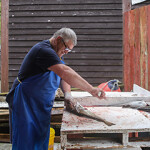Nissui’s profits pushed down by COVID-19

Tokyo, Japan-based seafood conglomerate Nissui released its consolidated financial results for fiscal year 2020 on 13 May, and its related presentation materials on 21 May, indicating the company saw a decline in sales and profit.
The company reported its net sales declined by 4.9 percent, and its operating profit dropped 20.8 percent. Ordinary profit was off by 11.8 percent, and profit attributable to the owners of the parent were fairly stable – down just 2.1 percent. The year-end dividend will be increased by JPY 1.00 to JPY 5.50 (USD 0.01 to USD 0.05, EUR 0.01 to EUR 0.04), with an annual dividend of JPY 9.50 (USD 0.09, EUR 0.07). Dividends are paid only twice a year in Japan, as opposed to quarterly in the United States.
Net profits were down in the first half of the fiscal year by 37 percent, but only by about 5 percent in the second half. The company cited declines in the global demand for dining out and tourism due to the COVID-19 pandemic. Sales to domestic convenience stores fell as more people worked from home, but largely recovered in the second half of the fiscal year. Domestic sales of frozen foods and marine products for home use were strong, but fish prices were low.
In its food products business in Europe and North America, processed foods for household use saw steady sales, and foodservice sales were boosted by takeout and delivery services.
In its marine products business in South America, revenue and income decreased due to low prices and reduced production of salmon, and poor catches in the fishery business. Japanese import prices of Chilean coho salmon dropped from around JPY 700 (USD 6.42, EUR 5.27) per kilogram in 2019 to JPY 500 (USD 4.58, EUR 3.76) in 2020.
In the marine products business in North America and Europe, profit decreased in North American processing due to lower selling prices of surimi and fillets, lower yields, and higher costs related to COVID-19.
The company saw single-digit declines in sales in the all of its business sectors except logistics and “others.” As for profits, the marine products sector performed the worst, with a year-on-year drop of 49.5 percent. The other sectors are food products, up 9.7 percent; fine chemicals, down 7.8 percent; general logistics, up 10.9 percent; and others, up 6.9 percent.
The company also reviewed its progress on its 2018-2020 mid-term business plan, highlighting that Nissui continued expansion of its European businesses. Nissui owns fresh fish processing company Caistor, which it bought in 2017, and took a controlling 75 percent interest in another fresh fish processor, Flatfish, in 2019. In France, group company Cité Marine expanded its product categories to include processed shrimp, and in Thailand, Nissui is expanding quick-service and fast-food restaurants under the Thai Delmar brand.
The company also said it pushed forward in advanced aquaculture, including land-based, and the application of digital technologies. Nissui already has land-based mackerel, salmon, and vannamei shrimp production facilities, and is using image analysis to count fish in aquaculture cages. However, high mortality hit its aquaculture facilities for three different species. Expensive closed-cycle bluefin tuna seedlings suffered typhoon damage, coho salmon suffered from poor acclimatization in moving from freshwater to seawater, and amberjack (kampachi) suffered from overstocking after demand dropped.
In 2021, the company expects recovery in the U.S. and Europe, due to widespread vaccination. Japan is lagging with only about 3 percent vaccinated, and it will likely be 2022 before the home market normalizes. The company also said that it expects that the domestic aquaculture and chilled businesses will be improved, and that salmon/trout aquaculture in South America will be restored.
Photo courtesy of Wikipedia





Share